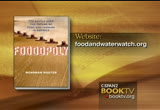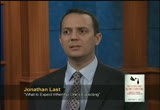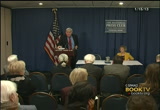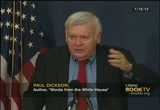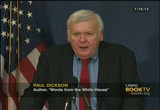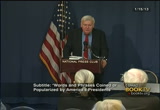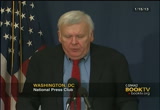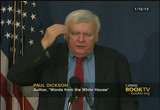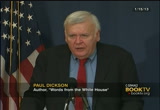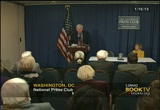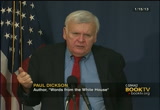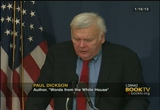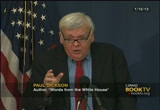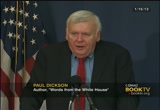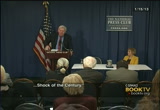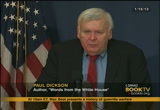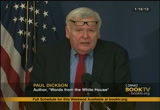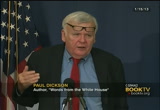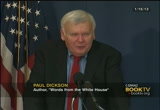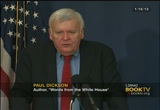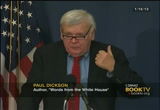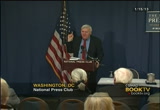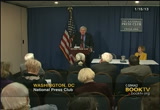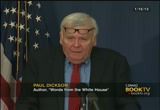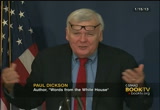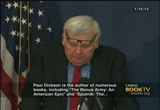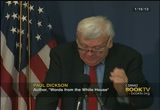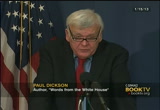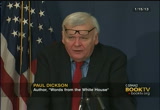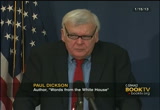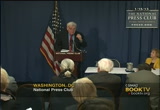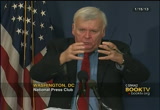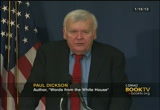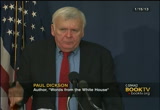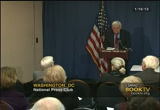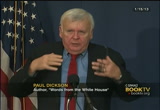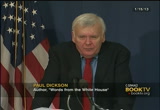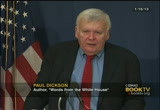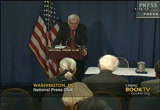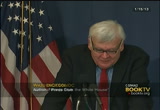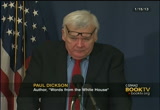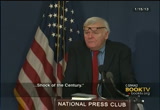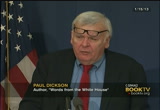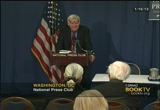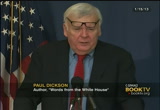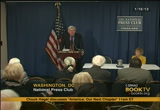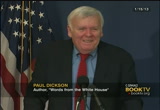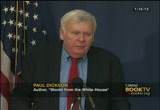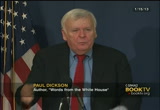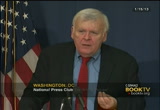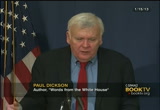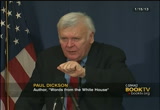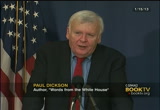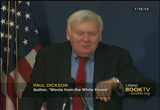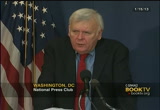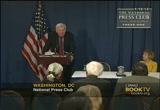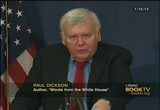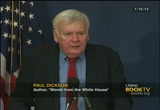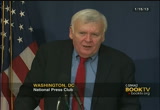tv Book TV CSPAN February 2, 2013 9:00am-10:00am EST
9:00 am
people have to keep these elected officials honest and have to have their constituency doing it. that is what our organizing has been focused on. >> [inaudible question] >> in the organic food is and where to anything. the industry influenced and paid for, that is the problem. research is for sales. i don't think much of it. thanks so much. ..
9:01 am
>> and then immediately after the first world war -- or the second world war, sorry, we had the only major incidence of increased fertility rate, and that's the baby boom. everybody knows about the baby boom. and it really was a remarkable moment, because not only did the fertility rate increase quite high, as high as 3.7, i think, for white americans and, i think, 3.9 for black americans, not only did it jump up, but it stayed up for an entire generation. it was a really long lasting effect. people changed the way they lived for a generation, and then by 1970 that momentum had ended, and we saw not a gradual floatdown, but really dropping off a cliff. >> jonathan last on how changing demographics and birthrates could cause the u.s. to lose its
9:02 am
place as a world leader sunday night at 9 eastern on "after words" on c-span2. and look for more online. like us on facebook. >> next on booktv, paul dickson presents a collection of words popularized by american presidents including warren g. harding's founding fathers invoked during his presidential campaign, theodore roosevelt's use of the word muckraker in a speech critical of specific journalists, and military industrial complex delivered by president eisenhower during his final presidential address to the american public in 1961. this is a little under an hour. [applause] >> thank you very much. i've been playing around with words for a long time, and i think when i was a kid, one of my -- i wasn't that athletic, and i wasn't that, you know, smart in various ways, but i
9:03 am
could always go home and memorize a couple words, so i would learn words like apathetic and things like that. you know, for a third grader, it was a lot of fun. and as i got to be an older person, i got really fascinated by doing some tricks with words. one of my favorite exercises was one time i was, when my kids were young, you know, they worshiped the guinness book of world records, and, um, in those days in order to get in the guinness book, you had to either eat a bicycle or push a peanut across iowa with your nose. and i was looking at the guinness book, and i came upon the word that had the most meanings in english which was set. it had 137 meanings, you know, set of numbers, set of tennis, etc., etc., but set meaning set your hair. but it was the word with the most meanings. so i realized that the soft underbelly of the begin us in book was language, was words. so i started working on a collection of words for drunk,
9:04 am
and i have now gone through about seven or eight collections. in fact, there are people in this room who have, actually, added to the collection in the last 72 hours. but we're now up to almost 3,000 words. as synonyms for drunk. and what was interesting was it was not meant to be a celebration of what is a social ill, but it was to show the phenomenal sort of what english, what the english language is, how many euphemisms, how many different terms we have. and what really got to me was looking at all the other people who had collected lists of drunkenness from their time: tom naine, benjamin bierce, langston hughes had all been sort of fascinated at their moment in many history that there were all these you nhls -- euphemisms used for drunk. and i have many, many helpers,
9:05 am
some of whom are in this room tonight, that they go back to shake steer -- shakespeare, and a lot of them are unscrambling euphemisms. in shakespeare, example, coming into the room and the sun was in his eyes, that was a euphemism for drunk. more than a dozen books are about language, and they range from the very serious books like i've done a baseball dictionary which has been in three decisions and is now about 10,000 entries which is more than what most people want to know about baseball. but i look upon language as a recreation. i guess the term is recreational linguistics which is the ability to use language as a play thing. what drives us to cross word puzzles and scrabble games and things like that, language as pleasure, language as reck rawtion. if you're drowning in yale help,
9:06 am
that's the most efficient use of language, help, but a lot of it's word play. and one of the reasons i can wow 4-year-olds with knock knock jokes because they're based on word play. but this book got me started and, again, i've done a number of books on language. this one really got me started. a while back i made a sort of what i thought was an interesting discovery which is the word "founding fathers," the phrase founding fathers did not go back to the early days of the republic but, in fact, was created by warren g. harding for the or 920 front -- for the 1920 front porch campaign. he actually used it once in 1918, but it was really his phrase, founding fathers, referring to those people who wrote the constitution and created the country and created its fundamental set of values and laws. and, um, before that i couldn't, i just couldn't get over the
9:07 am
fact that there was no earlier use, and i used all the databases, and i actually got some at the legislative service at the library of congress to back me up on it saying can you guys find an earlier example of it? at first there was a deep breath saying, oh, my god, this guy's nuts, but the idea is, nobody could find it. somebody said the founding fathers of harvard university or something, but it was never used as a descriptor, and it really didn't take off until 1941 when a book was written called "founding fathers." but it was immediately adopted by both sides of the aisle. although some of the early uses when you go back and track when it starts being used in the '20s more and more often and replacing the word "framers," it was up used as a negative. the founding fathers never meant for us to have pastel-colored
9:08 am
postage stamps or never meant for us to help poorer nations at the time of war. it was used as sort of giving these people who framed the constitution sort of a collective veto on certain things. and it was an interesting use of language. and then i got fascinated with harding because harding's misuse of the language was so intense that warren g. harding -- i mean, h.l. mepgen crutted a term which was a description of how badly harding murdered the language. but harding had an interesting ability to create words like bloviate meaning to, what i'm doing right now -- [laughter] orate, you know, pompously. but he also, it was also his way, he picked up a very old word that had really no use at all except in chemistry which was normalcy. normalcy had existed before in chemistry for a state of normality, but it was during the 1920 front porch campaign which
9:09 am
is another term that came out of the harding years that we first heard normalcy. and it was the return to normalcy. and, of course, immediately everybody threw up their hands, and the language police went crazy and said this was not really a word or anything. but it gradually has worked its way into the language. often after there's a major calamity or a major setback in this country somebody will say a return to normalcy, and people don't really bat an eye lash. it's now considered a p proper word. or it's not a prop or word, but -- aaron mckeon said the other day, somebody said something wasn't a word, and she said, no, no, you've got it wrong. you don't have to be a pedigree to be a dog. and so a word is still just nothing more than a unit of communication. um, but so i really started looking into this. did a lot of research, a lot of looking into the presidents. and the storyline in this, it's an a to, and book -- a to z
9:10 am
book, and you can dip in as you see fit, some of this stuff is funny, some not so funny. but really the nexus of the whole thing is if you look back at the beginnings of this country and the whole concept of language and of what this country was, there's a letter that's written between benjamin franklin and noah webster, the dictionary maker, in which they talk about acts of resistance, acts of rebellion, acts of response to the british. and they're talking -- they use various words to talk about it, but they're really sort of american acts to sort of identify who we are as a people. and what are involved in these acts? one of the acts is public libraries. benjamin frank lip has come -- franklin has come to this country smuggling a bible, smuggling a bible under the seat of a chair and tells benjamin at
9:11 am
one point that one of the things, most important things you can be is a printer. and this is the idea that when england at that time when his father came over, when the franklins came over, in england there were only two printing presses, one in oxford, one in london. and franklin was very interested in these acts, these definitions of who we were as a people. so when franklin creates a free library in philadelphia, this is seen as an act of resistance, an act against the british. it's a thumbing of the nose against the british. when noah webster goes and literally crusades for literacy, this is his way of not only to sell dictionaries and books that he, spelling books and such, but it was also part of these acts against the british. and coup wright is another. -- copyright is another. webster is one of the early people with this. and the early presidents are all very much aware of this. jefferson probably is the lead
9:12 am
on this. jefferson creates words with great, great abandon. he just loves to create words. he loves to sort of tuck a jibe at the british by creating words. 1840, much later, but he writes -- i'm sorry, 1820, he writes a letter to john adams, and he says, you know, our duty, our duty as americans is to knee control eyes. so jefferson creating all these words, and some of them are -- he creates the word ottoman. not for the empire, but for the not stool. he creates -- for the foot stool. there's 114 words now in the oxford english dictionary which are credited to jefferson either as the coiner or the introducer, the first one to actually bring them into the, into the mainstream. and the list is really sort of fascinating. um, pedicure is his word.
9:13 am
pussy -- i'm sorry, pussy, that's teddy roosevelt. monoaccurate, meaning a person who believes in a single rule. the one that becomes the most egregious to the purists and the language police is the word "belittle." he creates the word belittle. he knows what he's up to. he knows he's creating something that's going to be very disturbing. noah webster himself just loves the word. in fact, one of noah webster's teachers at yale writes noah webster a letter about the word "belittle," and the british hate the word to the extent that when fowler comes out with modern english usage in 1938, fowler is still attacking the word as a sort of piece of american trash that jefferson did to create sort of a disturbed the british. the very early days of language
9:14 am
from jefferson, adams, washington, they all were aware that they were creating a new language. and one of noah webster's precepts was that the united states -- the american language would be descriptive rather than proscriptive. it would not be the king's english. edit would not be dictated by a single authority. it would the language of the trapper and the farmer and the tradesman. so when webster really starts to go into the dictionary he's mustering out at the end of the revolutionary war and he is in a camp in newburg, new york, and there's groups, large groups of people mustering out at that point, and there's groups of cockney, and there are groups of irish and their brogues, and there are indian, american indian groups, and there are all these other groups, people speaking german, and he's wandering through these fields, and the campfires are burping. and webster says -- are burning. and webster says we're going to
9:15 am
have to create our own american language. and so he's right from the beginning he's very adept at picking up words from -- indian words like creek instead of brook which is the kind of thing that the british are very upset about, the idea that you were taking -- raccoon was one of the first ones, john smith introduces the word raccoon, it was an algonquin indian word which means he who washes his face with his hands. and they would pick up words like sleigh and coleslaw from the dutch and cafeteria and hacienda from the spanish. and, again, this was seen as acts of defiance, and it was very clear right through, you know, madison comes up with his own -- i mean, madison, maybe the greatest word madison came up with, squatter, which came out of his head. he needed a name for somebody who was illegally possessing somebody else's property. john adams came up with a bunch,
9:16 am
caucus which he gets from an indian term, speck, meaning to buy something on spec, speculation. quixotic meaning in the man or of don quixote. that was adams. john quincy adams when he was pretty much, when we came to the alien and sedition acts, he came up with the term -- needed a name for what was going on -- and he came up with gag rule. that was his. so you see in the early presidents this ability to sort of watch things and write them down and use them. so when george washington in the oxford english dictionary if you go in there today and look up the word "tin can," you will find that that is credited to george washington. bakery and bake were washington's words. washington came up with these words in a very early time when the bakery was a bakehouse like a smokehouse. there was a distillery, and there was a bakehouse, but then
9:17 am
in washington's diary it became a bakery. so this was part of our early -- and, of course, the fact that we had weber the to write this all -- weber the to write this all down is amazing. when noah webster comes up with his first dictionary in 1807, there are two words that really, really bother the british, and those are "congressional" and presidential. and they say they have no reason in the duction their. and between 1807 in the first dictionary and his second dictionary in 1820, webster goes to england and walks the streets of england picking up language, and he knows this is the stuff that is not in the english dictionaries at that time. the samuel johnson had not picked them up. he saw the language of the street as what was part of language. is so there was this sort of democratic background of this thing. and as it goes along, there are
9:18 am
things that, for example, jefferson creates which are hysterical. i mean, he comes up with twistification which sounds like something that george would come up with. [laughter] but there's some, there's some just wonderful things. and, of course, probably on the seedier side -- and i'm relying on the oxford english dictionary to tell you this, but the cop la story verb to shag is credited to thomas jefferson in one of his diaries, and it does not appear in any slang dictionary for another 30 years. and this, again, i'm using the be all and end all for sort of early nailing down when a word was created. and so austin powers did not create the word "shag," it was thomas jefferson. [laughter] you can tell, by the way, that i have a lot of fun doing this. the other challenge was just looking at how this progressed. you can look at different presidents and see who really was just remarkably clever, who was really, you know, the
9:19 am
smartest. i mean, along the way there was president johnson, the first president johnson is the first one to come up with the phrase and the concept of racial discrimination. the first time discrimination had ever been used in the distinction between race, religion, etc. discrimination in the fact as opposed to judging the size of eggs or something, being discriminate. and so by giving it a name, it started to have its own life. the ability of a president to name something -- i'm jumping ahead a little bit. but in 1934 franklin d. roosevelt was going to give his annual address to congress. it was from day one in this country the president in the beginning of the year would give an address to the nation and to the congress. and roosevelt in 1934 says, oh, i'll give it a name, calls it the state of the union. so a lot of these testimonies which were sort of created by presidents, we think, are there
9:20 am
from day one. in fact, they're ones that have been added later. and, again, some of them are just wonderful. i mean, i'll just jump to a couple. zachary taylor created the term first lady. that did not exist. he applied it to dolly madison. that was the first anyone had ever used that term. he said the first lady of the land. benjamin harrison was keep the ball rolling. i'm jumping around a little bit, but it's sort of fun. woodrow wilson had potomac fever which something harry truman loved to quote. politics is adjourned was woodrow wilson's. watchful waiting was very closely associated with woodrow wilson first in his relationship to the dick dictatorship in mexo where there was a lot of feeling that we should go in and intervene in mexico where there was a fairly active and ugly dictatorship afoot, and wilson said, no, this is -- we're going
9:21 am
to be, this is watchful waiting. we're going to wait and see. and once the world war started during world war i, that was attributed back to wilson, that he was using the term "watchful waiting." for whatever reason, watchful waiting is now familiarly used in diagnosis of certain illnesses where rather than treat them immediately, you go through a period of watchful waiting. so that's one of the more serious ones. some of them are capricious and interesting. you know, mckinley, william mckinley when the spanish-american war starting, mckinley's got the telephone, he's got the telegraph, he's got a room full of maps. he sets up the telephone, sets up the telegraph, pulls down the maps and declares this is my war room. that term does not exist before then. still jumping around, you know, it's coolidge, calvin coolidge comes down from massachusetts where he's put down a police
9:22 am
strike in boston, and he is, he goes to the convention, and he is the law and order candidate. finish and there are political buttons out there on ebay and stuff that says, you know, calvin coolidge, the law and order candidate. that was his -- the phrase had been used before, but it was the first time it had really been used as a political motto. the, um, again, there are various people i just have to sort of list as the best people. there are a couple things that are in the book that are not american that came from overseas. disrailly is the one who created dark horse which is very much a part of the american political language. and one that sort of threw me a bit was that the first person that used social security was winston churchill. he used it in 1906 in an essay about modern society and what has to be done. but he's the one who creates the term "social security."
9:23 am
um, there were some people who really did well with it. i think if you're sort of going down a list of who were the most powerful presidents in terms of language and innovation, i think you've got to have franklin d. roosevelt, he's got to be way up there. not only the phrases day of infamy, iffy, 937 he gives a press conference, and he's talking about the supreme court, and he said some of the decisions of this supreme court are, if you ask me, fair i -- they're iffy. and the next day the lead in the papers was not what he had said about the supreme court, but it was, in fact, the president created a word today, "iffy." and for five or six years anytime a columnist said pardon me if i use the president's word, but this is an iffy preposition. and the fact that he could just use this piece of slang. and, of course, slang gets them in trouble. woodrow wilson is a great slangster, and one of the
9:24 am
things -- there are editorials. he'd say let's get a move on, and he'd use gal instead of girl. almost like tin pan alley's kind of slang. and he was really lambasted in the papers for the use of slang. and, you know, he would come up with these aphorisms, a man's leafage depends on his rootage. you know? [laughter] and the guardians of the language were just appalled by this, by his use of this. and he was, he just loved to play around with language. and presidents do get in trouble. i'm not even going to mention george bush in this breath, but the biggest flap is probably -- well, teddy roosevelt does write a letter to the head of the english department at harvard university saying that he believed we should be splitting ip fintives, and that created -- infellowshiptives, and that created its own furor. [laughter] eisenhower's second inaugural, he gets up, and he's -- eisenhower's quite articulate and comes up with some wonderful
9:25 am
phrases. domino theory is his. he comes up, of course, with military industrial complex which rings down through the decades. but in the second inaugural he said before we can finalize our plans, and the word "finalize" was such a discordant tone that there were editorials all over the country. there were people wringing their hands. bergin evans had to do a special column for "parade" magazine defending eisenhower for turning, creating this verb out of the word "final." and they hadn't even heard prioritize yet. [laughter] but it was just this angry sort of reaction to his use of that word that was astonishing. and eisenhower did have a nice, very nice way of talking. but, and created some nice stuff. counterproductive is eisenhower's according to the oxford english dictionary. the first example of the word
9:26 am
counterproductive which sounds like a military, bureaucratic term. it sounds like something somebody would say in a war room. doing this is counterproductive, it doesn't get us anywhere. i'm building up to who i think is the king of them all. so there's a little bit of a -- um, lyndon johnson had some nice ones, but lyndon johnson picked up a couple -- again, i'm using every authority i can find, but lyndon johnson, i'm sure he picked this up from jazz or something, pressing the flesh was a johnsonnism. i'll be down there pressing the flesh. and ladybird gets credit for motorcade. that doesn't exist before she comes up with motorcade, and it's picked up by "time" magazine. there's no at least written example of that being used before that. richard nixon has some nice ones. he, depending on your point of view, but silent majority is his, expletive deleted is really a coinage either of he or his
9:27 am
speech writers when they're actually going over the records of the watergate, they use the term. instead of saying censored or bleeped, they used expletive deleted which became its own sort of curse word. another one which was very interesting at the time, created quite a stir was when he talked about, started talking about winding down the war and winding down seemed to be sort of a, you know, we're winding up, you were winding -- it was new to american ears and created some real response at that time. um, george herbert or -- herbert walker bush came up with new world order, thousand points of light. he got that somewhere else, but he made it his own, popularized that. george bush came under a lot of criticism for a lot of his terms, and i did -- i took them all at face value.
9:28 am
i went and looked them up. in other words, i didn't want -- the cheap shot is to say that these were all malapropisms and he was entirely off the wall. but i did find out that imbetter, which is one of his, according to the oxford english dictionary entered the language in 1853, and the word rez ig mate came into the language in 1531. and separatory was actually a creation of saturday night live, and he never did say it. [laughter] but the one you can really hang on him is misunderestimate. [laughter] but there have been several pretty well known people who write about language online including one of the top writers in england who said, um, he said it actually works. it's to underestimate by mistake which he says happens to all of
9:29 am
us, especially dealing with building contractors. so it may be one of these words like normalcy which will gradually become more and more acceptable. i guess aye got to jump here -- i've got to jump here. i'm just thinking of anybody else i've got to mention in pass, but i guess i've got to go to -- the king of them all has got to be without question, and at the back of the book i pick the neologist in chief, and even though jefferson clearly wins on volume, it's got to be teddy roosevelt. roosevelt just has, he just goes up and down. his is parlor pacifist is his, parlor pupg is his. -- pink is his. weasel words is his meaning euphemisms, the meaning of which is like a weasel, stealing the meaning out of it. he had the analogy of the
9:30 am
weasel. lunatic fringe is his, and he comes up with it in reference to -- he sees the armory, the famous abstract expression, beginning of abstract expressionism in modern art, and he sees the due champs nude descending the staircase, and he says in every movement there's a lunatic fringe that takes over and destroys. roosevelt has got, um, he's got invisible government is his, a secret bond between government and business. he's got malefactors of great wealth, he's got great white fleet which is what he dubs the group, this fleet that'll go around the world. ..
9:31 am
he crusades against them, seton thompson is one of them. one of my favorites, william safire proved this before died, a lot of this stuff is deeply involved with william safire and guided lot of research for these terms, mulligan with eisenhower. the term teddy roosevelt which was loose cannon meaning not in the nautical sense of the cannon on a carriage floating on the deck of a ship, but meaning
9:32 am
erratic, person out of control, person -- you go through the book you find the other one which was quite curious was good to the last drop, the maxwell house famous restaurant and hotel in nashville, tenn. pour a cup of coffee and said good to the last drop and got a company promoting this coffee all over the country, national brand using teddy roosevelt's slogan, the first and only president to write an advertising slogan. so i think the next question everyone wants to know is how does our present president, president obama, what has he done? he has done a couple interesting
9:33 am
ones. shovel ready is really his. hard to find that anywhere. the first t.a.r.p. we got shovel ready. snowmageddon is his. that was a totally spontaneous 2011 monster storm that came through, leaves the white house and gets, everything shutdown, he gets to the hilton hotel, this is snowmageddon. in 2011 he used the term sputnik moment. in his state of the union special saying this country needed a challenge, and outside moment that would generate our interest in research and development and education as had the sputnik launch in 1957. to a younger generation, sputnik is probably not as big a thing
9:34 am
as it is to an older generation but that was pretty clever but most of his slogans, most of his abilities have not really caught on. another one he came up with, he was in washington and he said it is a strange construct but in august, this is the time when washington, things are hard to get done. nobody knows what that means but somehow is applicable. on that low note, i think i will see if you have any questions. yes, ma'am? >> i am surprised you didn't mention the president's we popularly thing, the most eloquent like ronald reagan and john f. kennedy. were they just good at regular words? >> john f. kennedy had wonderful
9:35 am
phrases, the new frontier was is that they were more eloquent in the sense of their ability to give speeches. they didn't have -- wasn't that they created a term that was everlasting. some have interesting -- go to new frontier, truman had some nice ones. brought back an old american term, truman -- have all got stories. my favorite was truman was having trouble with congress and invoked an instrument, a metal instrument that is used to relieve pressure in organic places. in a freeze in missouri was the
9:36 am
bull or a cow would eat too much clover there would be a huge amount of gas inside the animal and they would in search a device that would create a whistling sound that would cascade along the prairie and truman wrote to one of his aides and the buck stops here, jumping around a little bit, actually a sign that was an allusion to poker. it actually was a friend of his had brought it from a prison gift shop where one of the prisoners had carved it on a piece of wood. but again, there is eloquent. i didn't address presidential eloquence. i was looking for the phrases, the key words and their origins. i think i have five pages of the
9:37 am
book on the new deal, this was franklin roosevelt's big program. we think of the new deal years, that whole period and roosevelt, everyone of his aides actually claim they invented the term but roosevelt's meeting with one of mark twain's distant relatives, he insists that he got it from connecticut yankee in king arthur's court in which the hero is trying -- characters, the peasants are subjugated the rule of king arthur and not doing very well and he stands up and says you guys need a new deal. and the other one, i am digressing for a second because i'm working on another book about words by famous writers.
9:38 am
remember the old laugh in show, they always start with a picture of mark twain. because this connecticut yankee, he is also the first to use sock it to me. they are about to hang him, about to execute the hero and he said come on, sock it to me. the other one, something from a book, if you read paradise lost carefully you will find john milton in paradise lost talks about all hell breaking loose. >> comment and the question. first a comment. with your introduction of all these new words i don't think english is our number one language anymore. i think it is more like united states. we don't speak english, we speak united states. >> that is what h. l. mencken
9:39 am
did with his monstrous three volume on the american language which he was roundly criticized for but a guy earlier than that in 1910 came out with a dictionary of americanisms and found 50,000 words which were american in origin. many are lost in time and many having to do with names of apple's, things like that but were american in their basis. 1807, the first noah webster dictionaries he said in 50 years the predominant form of english will be american. that term for american words is jefferson's own. >> question, of franklin roosevelt's fireside chats, did he claim that phrase or was that done by 0 radio commentator?
9:40 am
>> the guy was harry butcher with nbc -- abc -- cbs. he invented it. the first one to enunciated and roosevelt wasn't prepared for it was robert trout who introduced the fireside chats and the word--at first roosevelt wasn't sure and then realized it was perfect for what he was doing and it was always associated with the fireside chats. a quick digression. i have done some baseball writing, baseball dictionary and one of the things i found out was when roosevelt is starting to write the fireside chats he is a very well-educated man with slightly aristocratic boston brahman sound to his voice but he wants to talk to the american people. the fireside chats are coaching them out of the depression.
9:41 am
he starts using baseball very heavily. my bockscar score with congress is terrible or i can't get to first base with this legislation or some member of the opposite party on left field, don't understand what is going on so he would use these metaphors and it is picked up by eisenhower. eisenhower mixes it with a lot of football metaphors but that sort of becomes a big change in the language, the president's take on more popular metaphor for explaining things which in an earlier generation would have been explained in more legislative sort of bureaucratic kind of language. all of a sudden we can't get to first base or touchdown or something. >> white house speechwriter
9:42 am
ruined presidential eloquence? >> good question. they have had them all along. some people would argue the best stuff was written by speechwriters. there is a question whether eisenhower actually wrote military industrial complex for was that mel lewis, one of his aides. maybe they have homogenized it. maybe that -- i still think there has got to be some degree of spontaneity. probably no speech rider -- when obama said snowmageddon, and obvious blend of snow and armageddon, he probably just popped out of his head. they'd dumb them down to some degree. president obama last summer analyst of 20 of his slogans and all dead fish.
9:43 am
together we win, if we don't have any resonance, sometimes some of the christmas goes out of it but it is a good question. a guy like bob borman, good friend and speechwriter for gerald ford. i suspect bob norman was a great asset to gerald ford and wrote some really good stuff. >> it is very interesting what john wood said, he heard speaking of the united states. would you tell that? >> very ethnic neighborhood of northeastern pennsylvania, one of my classmates said something to his father who -- had a difficult time speaking very
9:44 am
broken english and the father -- go to school to learn english. but he said speak united states. >> not english, speak united states. >> we are speaking a language we created here in the united states, created by presidents and other people who use the language, speech writers or whoever and the writers themselves. doing this other book, i haven't even started writing it but copious notes. sometimes when a rider comes up with something nobody can understand, when f. scott fitzgerald -- the critics can't figure out what is a t-shirt. he made it up. it wasn't -- it was -- often writers and presidents create a
9:45 am
word on purpose to create a stir, a moment of interest in what they're doing like norman mailer -- norman mailer created the word factoid, something that was not a fact at all but a piece of conventional wisdom that was wrong but now it is used to mean many fact or small fact. >> i missed the first part of your sensation. may be addressed that. what do you think of in new word from the white house becoming popular, something that might be forgotten or lost? >> absolutely. that is the whole business of creating words and i quoted the lexicographer who said a word is just a single unit of
9:46 am
communication and just because it is not in the dictionary doesn't mean anything. don't have to be a cutter to be a dog was for one liner. there is no reason you can't make a word. i have been working for years to create a couple words. i created the word demonym, and there was never a word for those names for places where people come from. it gets into this book. or washington creates michiga e michigand michigander, then people say is actually michiganian. i tried to get that wording to the dictionary but failed so far but now that it is on c-span, maybe. >> the media, to become --
9:47 am
something. >> depends on popular use. one of the words that came out of the 80s was the word he among this --humongous. two kids walking down the street in los angeles, one kid says i have this humongous exam tomorrow. it sounded so good, it spread like wildfire. over the years people who study how a word or a joke, one of the great mysteries of anthropology, how does the joke go from los angeles to johannesburg in three days and is partly this language -- great british folklorist call the hidden language of childhood. they talk about things like jump
9:48 am
rope. humongous now, first time you heard it you knew what it meant. humongous headache and i can't finish this tonight. even in this book, the one that really amazed me is john adams is credited with the word chickadee meaning the bird. can't imagine he came up with that himself. probably heard it from a gardener or someone in the street. he is the first one ever to write it down and define it and say what it is which again word is on a matter of poetic, made to sound like what it is. smile is the word for her smile, try to say it without smiling. for getting the greek and when stems, that is part of it. the word has got to fit. it can't just be something
9:49 am
created to be funny. it has to fit the situation. >> my question might be similar. you give examples like finalize and prioritize and i wish i knew the answer, what ending to add to that or if we picked up on that after words. for good ten minutes -- that is not a word but your point, when we adopt and pickup on and how does it become part of our vernacular -- you noticed that. >> what words did you say? >> exercise. >> there is a microphone in this room. if you say -- you can't really say it is not a word because all it is is a unit of communication. even though it got you angry and you wanted to throw pies at the person who said it the fact is
9:50 am
you knew what they meant. was a unit of communication and it worked. it might be useful as a word that makes other people in the room -- >> we understood what it meant like finalize was understood but you have fought on trends like that so finalize being a word and prioritize but how many things get picked up we adopted in other ways to make the same word? >> i have to find a reverse dictionary to find out what it means. rhapsodize about this beautiful singer, that works. a rhapsody finalize is not a major transgression. i did some language commentary at npr and there is language police out there and if you ever
9:51 am
say hopefully on npr the people come at you with dogs and let forges. there are groups out there of purists who want to keep it straight. i have talked to people who write dictionaries. they don't bring their hands in the language has gone over the cliff, they have said it changes. there are a lot of examples of words that were once another way. and apron was all so an apkin. but the letter migrated and became a napkin. i don't have the paperwork on this because it was a long time ago but when it migrated, there
9:52 am
were probably people pulling their flair -- pulling their hair out saying put it back -- language is organic. someone like myself who makes a living writing about this stuff, it is wonderful. one of the most recent words that went into the book that has the new addition, we are up to 2,890 -- 986 words and we are trying to get to 3,000 and they all have to be verified the one of my third recent ones was function way --feng shue a major interior designer had come out with furniture reorganized -- he was three sheets to the wind. >> regardless of that --
9:53 am
>> it is -- everybody tells and throws himself on the floor but it was meant to be an emphasis. regardless of what you say. the language in this country especially in this country is a daily -- if two million english teachers or two million school teachers to marcos at a regardless of what you say and hopefully i am wrong all those people are saying it is gone over the transom from barbarism to part of the way we talk so we don't -- we are down -- we're down to five minutes. >> the stylebook now accepts
9:54 am
hopefully. if you are a journalist you can use hopefully. >> fowler originally took hopefully to task. it was first brought up in the new yorker, one of the first places where was skewered, had been using hopefully before that in the very sense -- there are other people like merriam-webster who has done studies of the distinction between applied and said there is none and if the modern way which association -- is now. >> in the book do you talk only about once the presidents have or associated with 4 -- [talking over each other] >> obviously mentioned? >> i have a subcategory for ronald reagan which is interesting construction but words that come after them on hooverville, hooverize, hoover
9:55 am
was in charge of the feeding of europe and food stocks for the world, that meant to be frugal, careful, not waste food, not throw food away. it was a pause of term but hoover'sville was not. i do that too. that is part of the legacy. >> with it be harder for modern president like obama to notably yellow dye that was for the founding fathers and can you talk about how you research the book? >> reporter: it may happen by chance. when lincoln created some really interesting words one of the
9:56 am
words he first used he is talking about secession, there sugarcoating the impact on this country. when lincoln first used sugar coated the printer of the united states comes and says we cannot put this in the official word word sugar coated and lincoln said i can't any matt -- american not knowing what that meant. bling and also, going back to william safire's influence on this, one of the first uses of cool not in a sense of temperature but being callous, he said that was cool, that was callous, that was the behavioral thing. a word like cool, obama could come up the new meaning of cool, taking one word and give it a different meaning. how i did this was i did a lot
9:57 am
of reading and a lot of use of huge proprietary databases that the library of congress, nineteenth century database where you could find the original document, at 1807 when jefferson comes up with the phrase separation of church and state which is not in the constitution. the first articulated in this letter by jefferson so a lot of it was working at terminals with these monster -- these huge proprietary databases that captures every word and phrase. fascinated with this stuff. the mckinley thing came out of margaret leech's, i read that book years ago. when he comes to the war room there is this eureka moment.
9:58 am
we're down to one question. >>, about mulligan. >> meaning an extra shot in golf, the first hole, that is a mulligan meaning it is the do over. if it existed before and is only when eisenhower start playing golf and invoking the moment that the new york times has to do an explanation and a classic example of a piece of low slaying, boulter slaying and here is eisenhower playing with arnold palmer. >> is the name mulligan? >> presumably. it is like murphy's while. vague slight on the irish to take an extra shot. thank you very much, everybody.
9:59 am
[applause] >> at paul dickson, author of "words from the white house". for more information visit his website, paul dicksonbooks.com. >> you are watching booktv on c-span2. here is our prime time lineup. starting at 7:00 p.m. eastern jared diamond talks about his book the world until yesterday:what can we learn from traditional societies? at 8:00 p.m. former senator tom daschle presents a history of the u.s. senate. at 9:00 eastern retired general stanley mcchrystal accounts his career followed by our weekly afterwards program. this week jonathan lash discusses population him probation. . we conclude prime-time programming at 11:00 eastern with taylor branch, his most recent book the for the multi volume set about america in the king years focuses on key moments in the civil-rights movement. visit booktv.org for more on this
124 Views
IN COLLECTIONS
CSPAN2 Television Archive
Television Archive  Television Archive News Search Service
Television Archive News Search Service 
Uploaded by TV Archive on

 Live Music Archive
Live Music Archive Librivox Free Audio
Librivox Free Audio Metropolitan Museum
Metropolitan Museum Cleveland Museum of Art
Cleveland Museum of Art Internet Arcade
Internet Arcade Console Living Room
Console Living Room Books to Borrow
Books to Borrow Open Library
Open Library TV News
TV News Understanding 9/11
Understanding 9/11
